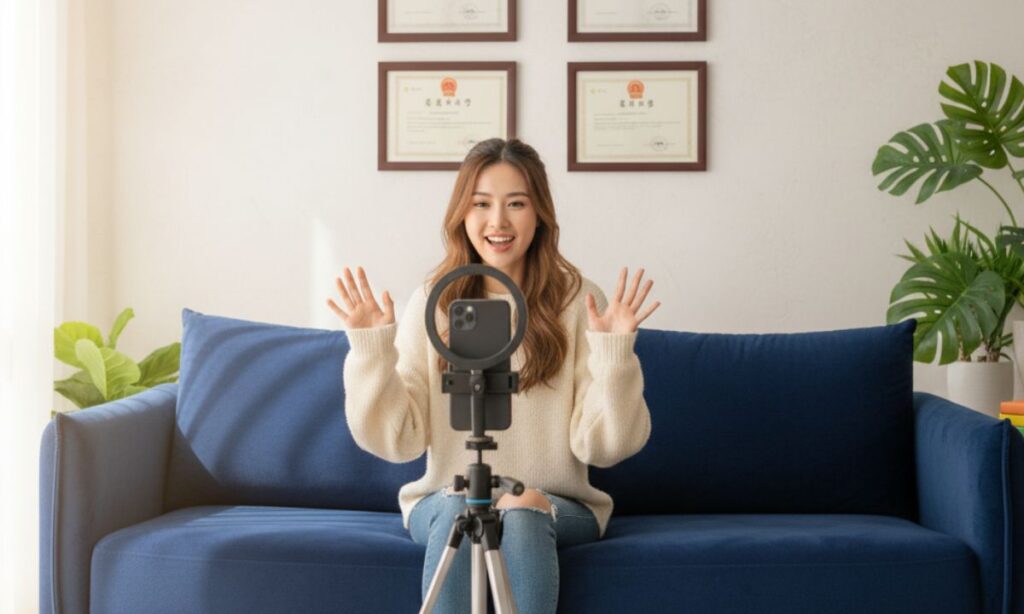China has taken a decisive step in the fight against misinformation on social media. As of October 2025, influencers whose content addresses sensitive topics (medicine, law, education, or finance) will be required to certify that they have formal training in these fields and, therefore, are qualified to disseminate information.
New regulation for influencers and platforms in China
This measure has been promoted by the Cyberspace Administration of China (CAC), the main Internet regulator in the country, and establishes obligations for both influencers and for the leading social networks in China.
Content creators will have a period of two months to submit their certifications, degrees, or verified credentials and demonstrate that they possess the necessary expertise to publish scientifically and academically sound informational content regarding medicine, law, education, or finance.
Additionally, to elevate levels of transparency and security, it will be required that such content clearly cite the sources from which the information has been obtained and specify whether it includes dramatizations or AI-generated elements.
For their part, platforms such as Douyin (the Chinese version of TikTok), Bilibili, or Weibo will be required to verify the credentials of influencers and ensure that everything is in proper order. Moreover, they will also be obligated to remind their users of their own legal and scientific responsibilities when disseminating information.
China has also banned the advertising of medical services or products
Other measures established by the CAC concerning sensitive content are intended to address covert advertising. On the one hand, they have banned the advertising of medical services or products in all forms (including medications, supplements, online consultations, health foods, etc.). On the other hand, they have ordered the removal of accounts using educational formats to promote products as well as those impersonating professional identities.
Finally, the CAC has also decreed that platforms must train their algorithms to identify and block sexualized content that is disguised as educational.
Similarities with Google’s Criteria for YMYL Content
The objective of the new Chinese regulation is to protect users by ensuring the quality and veracity of information disseminated on social networks regarding issues that have a major impact on the public’s well-being. This is a very similar premise to the one followed by Google with YMYL content (Your Money or Your Life).
Websites categorized as YMYL content are those dealing with medical, legal, financial, safety, shopping topics, etc., and, therefore, can influence the health, safety, or financial stability of users. Because of these characteristics, Google applies stricter criteria when evaluating this type of content for ranking in Search.
Moreover, YMYL content must satisfy both Google’s search algorithms and its quality evaluators. During the assessment, the principles of EEAT (Experience, Expertise, Authority, and Trustworthiness) are taken into account. Thus, websites that demonstrate greater adherence to these criteria are favored, thereby preventing low-quality or harmful content from reaching users.
Ultimately, both for Google and for Chinese influencers, everything comes down to demonstrating that you have the necessary training and expertise to be considered a qualified authority for publishing reliable content.
The Current Situation in other countries
At a time when the regulation of the role of influencers in social networks worldwide is scarce, China has set a precedent that could eventually be adopted by other territories. In the case of Spain, in recent years there has been progress towards a legal framework focused on establishing a clear definition of what constitutes an “influencer” and the obligations associated with these profiles.
On April 30, 2024, the Council of Ministers approved Royal Decree 444/2024, popularly known as the “Influencer Law”. This regulation technically refers to influencers as “users of special relevance” and states that a user is considered as such if they meet the following three conditions:
- They earn income equal to or greater than €300,000 from this activity.
- They have 1 million followers on a single video platform, or if the total number of followers across all platforms reaches 2 million.
- They publish at least 24 videos per year.
Influencers who meet these criteria must enroll in a mandatory register and are subject to the following obligations:
- Clearly identify advertising content, with the advertising of alcohol, tobacco, or medications being expressly prohibited.
- Request age verification, thereby preventing minors from accessing inappropriate content.
The New Code of Conduct for Influencers
More recently, on October 1, the new “Code of Conduct for Advertising through Influencers 2025” came into effect, promoted by the Spanish Advertisers Association (AEA), Autocontrol, and IAB Spain.
This document replaced the 2020 version and its aim is to ensure transparency and responsibility in advertising, guaranteeing that consumers are able to clearly distinguish whether content is promotional in nature. However, this code is not an official regulation and is voluntary in nature (except for companies affiliated with AEA, Autocontrol, and IAB Spain, and for influencers, agencies, and companies that voluntarily subscribe).
Photo: Gemini

